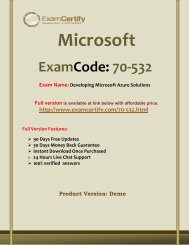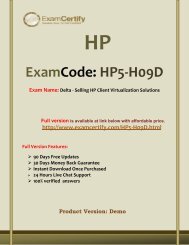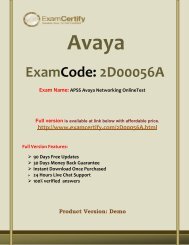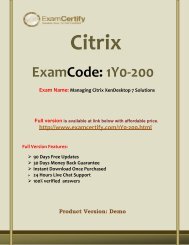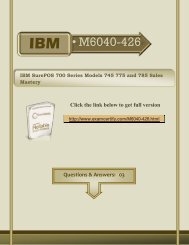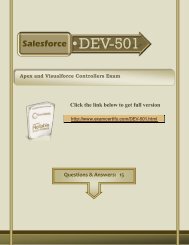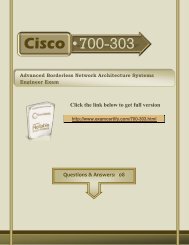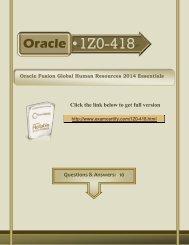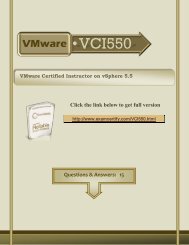•VCI510
You also want an ePaper? Increase the reach of your titles
YUMPU automatically turns print PDFs into web optimized ePapers that Google loves.
VMware<br />
<strong>•VCI510</strong><br />
VMware Certified Professional 5 - Data Center<br />
Virtualization for Instructors<br />
Click the link below to get full version<br />
http://www.examcertify.com/VCI510.html<br />
Questions & Answers: 20
Question: 1<br />
Which VMware solution uses the security of a vSphere implementation and provides linked-clone<br />
technology to virtual desktops?<br />
A. VMware ACE<br />
B. VMware View<br />
C. VMware Workstation<br />
D. VMware ThinApp<br />
Answer: B<br />
Explanation:<br />
Reference:<br />
http://www.vmware.com/files/pdf/VMware-View-4-Composer-DS-EN.pdf (page 1, last paragraph)<br />
Question: 2<br />
An administrator has recently upgraded their Update Manager infrastructure to vSphere 5.x. Several<br />
hosts and virtual machines have not been upgraded yet.<br />
Which vSphere component when upgraded will have the least impact to the existing environment?<br />
A. Virtual Machine Hardware<br />
B. ESX Hosts<br />
C. VMFS datastores<br />
D. VMware Tools<br />
Answer: D<br />
Explanation:<br />
VMware Tools isn't a single application but a set of drivers, services and user processes that's<br />
installed in a guest operating system. They add a wide assortment of functionality to VMware<br />
infrastructures -- everything from improving color depth and video resolution in the vSphere Client to<br />
memory optimization.<br />
Typically, an outdated version of VMware Tools doesn't have an immediate impact. But with every<br />
update to vSphere, you'll likely have to update VMware Tools on every virtual machine.<br />
Question: 3<br />
http://www.examcertify.com/VCI510.html Page 2
An administrator is using Update Manager 5.x to update virtual appliances in a vSphere environment.<br />
The environment is using the vCenter Server Virtual Appliance (vCSA).<br />
What would cause the remediation to fail?<br />
A. Updating of the appliance can only be done if the vCenter Server Virtual Appliance (vCSA) has<br />
been put into Maintenance Mode.<br />
B. Remediation must be configured on the Appliance Administration page before use.<br />
C. Remediation of the vCenter Server Virtual Appliance (vCSA) with Update Manager is not<br />
supported.<br />
D. Remediation requires the hosts to be connected to vCenter using an IPv4 address.<br />
Answer: D<br />
Explanation:<br />
Update Manager 5.0 does not support virtual machine patch baselines. If a host is connected to<br />
vCenter Server by using an IPv6 address, you cannot scan and remediate virtual machines and virtual<br />
appliances that run on the host.<br />
Question: 4<br />
An administrator is working to update the hosts and virtual machines in a vSphere 5.x deployment<br />
using Update Manager Baselines.<br />
Other than host patches, which three items require a separate procedure or process to update?<br />
(Choose three.)<br />
A. Operating system patches<br />
B. Virtual Appliance updates<br />
C. Virtual Machine Virtual Hardware upgrades<br />
D. VMware Tools on machines without VMware Tools already installed<br />
E. Application patches within the virtual machine<br />
Answer: A,D,E<br />
Explanation:<br />
Operating system patches are related to operating system so they need a separate procedure<br />
altogether. Same is the case with VMware tools and applications patches because applications are<br />
stand alone pieces of code that need separate procedure to apply a patch.<br />
Question: 5<br />
http://www.examcertify.com/VCI510.html Page 3
A series of Auto Deploy ESXi 5.x hosts, which utilize vSphere Standard Switches, are unable to boot.<br />
In prior testing, all of the hosts were able to boot successfully.<br />
Which two conditions might cause this issue? (Choose two.)<br />
A. The Hosts are unable to connect to the SAN.<br />
B. The TFTP server is down.<br />
C. The DNS server is down.<br />
D. The DHCP server is down.<br />
Answer: B,D<br />
Explanation:<br />
If the TFTP server is down, ESXi will not boot because it needs TFTP to get the information. Similarly,<br />
when DHCP is down, it will not assign the IP addresses and ESXi needs IP address to boot properly.<br />
Question: 6<br />
An administrator wants to monitor the health status of an ESXi 5.x host. However, when the<br />
administrator clicks the Hardware Status tab the following error is displayed.<br />
This program cannot display the webpage<br />
What might cause this problem?<br />
A. The VMware VirtualCenter Management Webservices Service is not started.<br />
B. The required plug-in is not enabled.<br />
C. The VMware ESXi Management Webservices Service is not started<br />
D. The name of the vCenter Server system could not be resolved.<br />
Answer: A<br />
Explanation:<br />
Verify that the VMware VirtualCenter Management Webservices service is running on the vCenter<br />
Server system. Navigate to the vCenter Server system in the inventory and select Monitor > Service<br />
Health. The page displays the following message if the VMware VirtualCenter Management<br />
Webservices service is not started.<br />
Could not get vCenter Health status<br />
If you see this error message, start the VMware VirtualCenter Management Webservices service.<br />
Question: 7<br />
An administrator would like to have vCenter take action any time a virtual machine is using over 90%<br />
of its available resources for five minutes or longer.<br />
http://www.examcertify.com/VCI510.html Page 4
Which three actions can be taken by vCenter Server in response to the trigger without running a<br />
script? (Choose three.)<br />
A. Power on a VM<br />
B. Reboot Guest on VM<br />
C. Increase Virtual Machine Memory<br />
D. Migrate a VM<br />
E. Increase Virtual Machine CPU Shares<br />
Answer: A,B,D<br />
Explanation:<br />
Power on a VM, reboot guest and Migrate a VM will be the actions taken by vCenter Server in<br />
response to a trigger without needing a script.<br />
Question: 8<br />
An administrator has purchased a new 10GB Converged Network Adapter (CNA) for<br />
installation in a system that is running ESXi 5.x. The administrator has downloaded the latest driver<br />
from the hardware vendor and wants to include the driver in an image. The image profile acceptance<br />
level is set to VMwareSupported. The acceptance level of the driver is VMwareSupported.<br />
Which two statements are true about the inclusion of this driver in the image? (Choose two.)<br />
A. Support calls for the driver will be directed to the partner.<br />
B. The image can be built, but the driver will not be included in the image.<br />
C. The image can be built and the driver will be included.<br />
D. Support calls for the driver will be handled by VMware.<br />
Answer: A,C<br />
Explanation:<br />
The acceptance level of all VIBs on a host must be at least as high as the host acceptance level. For<br />
example, if the host acceptance level is VMware Accepted, you can install VIBs with acceptance<br />
levels of VMware Certified and VMware Accepted, but you cannot install VIBs with acceptance levels<br />
of Partner Supported or Community Supported. To install a VIB with a less restrictive acceptance<br />
level than that of the host, you can change the acceptance level of the host by using the vSphere<br />
Client or by running esxcli software acceptance commands. Setting host acceptance levels is a best<br />
practice that allows you to specify which VIBs can be installed on a host and used with an image<br />
profile, and the level of support you can expect for a VIB. For example, a Community Supported VIB<br />
might not be recommended for an ESXi server in a production environment.<br />
http://pubs.vmware.com/vsphere-<br />
http://www.examcertify.com/VCI510.html Page 5
50/index.jsp?topic=%2Fcom.vmware.vsphere.upgrade.doc_50%2FGUID-27BBBAB801EA-4238-8140-<br />
1C3C3EFC0AA6.html<br />
Question: 9<br />
What are the three service offerings provided by a VMware-powered public cloud? (Choose three.)<br />
A. Committed<br />
B. Transient<br />
C. Dedicated<br />
D. Highly Elastic<br />
E. Basic<br />
Answer: A,C,E<br />
Explanation:<br />
Reference:<br />
http://www.vmware.com/files/pdf/cloud/VMware-ServiceDef-Public-Cloud11Q1-White-Paper.pdf<br />
(page 6, see service offerings)<br />
Question: 10<br />
An administrator has been tasked with upgrading an existing host from ESX 4.1 to ESXi 5.x. The<br />
existing host has only vSwitch0 with all the default settings. The upgraded host will have the<br />
following new requirements.<br />
116 virtual machines will be connected.<br />
Four uplinks configured for port-based load balancing.<br />
The switch will include a secondary heartbeat network for H<br />
A. Which two statements are true about this configuration? (Choose two.)<br />
A. The Service Console Port will be removed during the upgrade<br />
B. The configuration requires only one VMkernel Port<br />
C. The default vSwitch0 is sufficient for this configuration<br />
D. A change to vSwitch0 Properties is required<br />
Answer: A,D<br />
Explanation:<br />
VMware has removed the service console port group with the release of vSphere 5. You can execute<br />
the same command, which you used to do on vSphere 4 service console using vMA, CLI and<br />
PowerCLI.<br />
http://www.examcertify.com/VCI510.html Page 6
Question: 11<br />
When would a license server be configured for vCenter Server 5.x?<br />
A. When managing ESX 3.x servers<br />
B. When the vCenter Server Virtual Appliance (vCSA) is used<br />
C. Within the first 60 days<br />
D. A standalone license server is installed by default<br />
Answer: A<br />
Explanation:<br />
Reference:<br />
http://kb.vmware.com/selfservice/microsites/search.do?language=en_US&cmd=displayKC<br />
&externalId=1010704<br />
Question: 12<br />
What two Advanced IP Allocation Schemes are available? (Choose two.)<br />
A. Fixed<br />
B. DHCP<br />
C. OVF Environment<br />
D. Transient<br />
Answer: B,C<br />
Explanation:<br />
Reference:<br />
http://www.vmwarehub.com/Edit-vApp-settings.html<br />
Question: 13<br />
A company is planning an upgrade from vSphere 4.x to vSphere 5. They currently have three dual<br />
CPU servers licensed for ESXi 4.1 Advanced<br />
Each server has 256GB of RAM installed.<br />
Their virtual machines are sized three ways. Light. 1v CPU, 4GB RAM Medium. 2v CPU, 8GB RAM<br />
Heavy. 4 vCPU, 12GB RAM<br />
http://www.examcertify.com/VCI510.html Page 7
The Production workload consists of.<br />
20 Light servers<br />
20 Medium servers<br />
2 Heavy servers<br />
The Development workload consists of.<br />
10 Light servers<br />
10 Medium servers<br />
How will vSphere 5 licensing impact their upgrade? (Choose two.)<br />
A. They will need to purchase additional ESXi licenses.<br />
B. They will be able to reduce their power consumption.<br />
C. They will be restricted from powering on additional virtual machines.<br />
D. A license upgrade will be needed to add vCPUs to the Heavy servers.<br />
Answer: B,C<br />
Explanation:<br />
Reference:<br />
http://www.gabesvirtualworld.com/vsphere-5-licensing-with-vramisn%E2%80%99t-that-bad-at-all/<br />
Question: 14<br />
What is a benefit of vCenter Linked-Mode?<br />
A. Allows the vCenter Server Virtual Appliance (vCSA) to manage multiple sites<br />
B. Pools vRAM entitlement<br />
C. Increases vCenter security<br />
D. Increases vCenter reliability<br />
Answer: B<br />
Explanation:<br />
Reference:<br />
http://pubs.vmware.com/vsphere-<br />
50/index.jsp?topic=%2Fcom.vmware.vsphere.vcenterhost.doc_50%2FGUID-EC40636E0DD4-4A17-<br />
B163-5CFBDC31666C.html<br />
Question: 15<br />
What virtual machine action listed below can be performed on a template?<br />
http://www.examcertify.com/VCI510.html Page 8
A. Power on<br />
B. Clone<br />
C. Edit Settings<br />
D. Migrate<br />
Answer: B<br />
Explanation:<br />
Reference:<br />
http://robertparten.com/vmware-difference-between-clone-and-template/<br />
Question: 16<br />
Which functions can be performed with the Plug-in Manager? (Choose two.)<br />
A. Enable an installed plug-in<br />
B. Remove permissions for a plug-in<br />
C. View the status of installed plug-ins<br />
D. Uninstall a plug-in<br />
Answer: A,C<br />
Explanation:<br />
Reference:<br />
http://www.kumatech.ca/download/docs/110_6081EN_R3_HIT_VE_Installation_Guide_web.pdf (page<br />
13)<br />
Question: 17<br />
An administrator plans to deploy ESXi 5.x, but does not want to use CD or DVD media.<br />
What are two alternate ways to provide the ESXi 5.x installation script to the host? (Choose two.)<br />
A. PXE<br />
B. FTP<br />
C. HTTP<br />
D. IPMI<br />
Explanation:<br />
Answer: B,C<br />
http://www.examcertify.com/VCI510.html Page 9
ESXi 5.x allows you to use FTP and HTTP to provide installations script to the host if you don’t want<br />
to use DVD or other media.<br />
Question: 18<br />
Click the Exhibit button.<br />
An administrator has implemented a new vSphere 5 environment and is deploying their first<br />
Windows 2008 R2 template. When running the Deploy Template wizard, the error shown in the<br />
exhibit appears.<br />
What can be done to correct the problem?<br />
A. Select the correct guest OS setting for the virtual machine.<br />
B. Windows 2003 x64 cannot be customized.<br />
C. Download and install the Microsoft Sysprep tool into the virtual machine to be customized.<br />
D. Download the Microsoft Sysprep tool to the appropriate vCenter Server directory.<br />
http://www.examcertify.com/VCI510.html Page 10
Answer: A<br />
Explanation:<br />
http://kb.vmware.com/selfservice/microsites/search.do?language=en_US&cmd=displayKC<br />
&externalId=1005593<br />
Question: 19<br />
What is a valid example of a vSphere Update Manager upgrade?<br />
A. A VMware Tools upgrade on a Fault Tolerant machine with automatic snapshots.<br />
B. Upgrading and patching multiple ESXi hosts simultaneously in a selected cluster.<br />
C. Upgrading an ESX 4.1 host to ESXi 5.x with a sufficient boot partition.<br />
D. An ESXi 5.x host update with automatically deleted snapshots.<br />
Answer: C<br />
Explanation:<br />
Reference:<br />
http://www.vmadmin.co.uk/vmware/35-esxserver/283vsphere4to5migrateesx4toesxi5<br />
Question: 20<br />
Which three tasks can be selected from the home page of an ESXi 5.x host? (Choose three.)<br />
A. Browse objects managed by the host<br />
B. Browse NFS mounts for this host<br />
C. Download VMware vCenter or the vSphere client from vmware.com<br />
D. Shutdown or restart the host<br />
E. Download the PowerCLI installer<br />
Answer: A,B,C<br />
Explanation:<br />
PowerCLI is an extension, which builds upon Windows Powershell and can be downloaded from<br />
www.vmware.com/go/powercli. vSphere Remote CLI is a separate application which can be<br />
downloaded in Windows, 32-Bit Linux or 64-Bit Linux formats from<br />
https://my.vmware.com/web/vmware/details/vcli40/ZCV0YmRkJSpidHdw<br />
So from the options given you can Download VMware vCenter or the vSphere client, browse objects<br />
mounted by this host, and browse datastores (which could be Network File System (NFS) mounted).<br />
http://www.examcertify.com/VCI510.html Page 11
VMware<br />
<strong>•VCI510</strong><br />
VMware Certified Professional 5 - Data Center<br />
Virtualization for Instructors<br />
Click the link below to get full version<br />
http://www.examcertify.com/VCI510.html<br />
Latest tests<br />
70-331 70-332<br />
LOT-951 70-321<br />
HP2-T25<br />
HP2-T26<br />
70-341 70-342<br />
70-411 70-410<br />
70-336 PEGACLSA_62V2<br />
70-337 C_TADM51702<br />
HP0-J54 00M-662<br />
70-689 000-N37<br />
70-480 HP0-J59<br />
http://www.examcertify.com/VCI510.html Page 12



